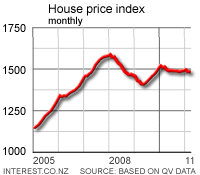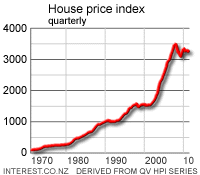 Government valuation agency QV is picking activity in the housing market will lift during the first few months of 2010 as owners who held off selling in 2009 decide to enter the market. An increase in sellers tempted in by higher prices should then see a leveling off in values, QV said.
The forecast comes as QV's latest market report shows nationwide house values increased further in December to 4.9% below their 2007 peak, from 5.9% below in November. It also follows figures from Auckland's largest real estate agency, Barfoot & Thompson, which showed its average sale price hit a two year high in December.
The main centres led the way for improving house values over 2009, with urban values rising 6.5% from their April low to sit just 3.9% below the 2007 peak, QV said. Lagging behind were provincial values, up 3.2% from their low and still 7.7% from their peak, and rural values, up 1.3% in a late rally to sit 6.5% below their peak.
"We expect that sales activity will lift in the first few months of 2010 as owners who held off in 2009 decide to move," QV Valuation Manager Glenda Whitehead said.
Government valuation agency QV is picking activity in the housing market will lift during the first few months of 2010 as owners who held off selling in 2009 decide to enter the market. An increase in sellers tempted in by higher prices should then see a leveling off in values, QV said.
The forecast comes as QV's latest market report shows nationwide house values increased further in December to 4.9% below their 2007 peak, from 5.9% below in November. It also follows figures from Auckland's largest real estate agency, Barfoot & Thompson, which showed its average sale price hit a two year high in December.
The main centres led the way for improving house values over 2009, with urban values rising 6.5% from their April low to sit just 3.9% below the 2007 peak, QV said. Lagging behind were provincial values, up 3.2% from their low and still 7.7% from their peak, and rural values, up 1.3% in a late rally to sit 6.5% below their peak.
"We expect that sales activity will lift in the first few months of 2010 as owners who held off in 2009 decide to move," QV Valuation Manager Glenda Whitehead said.
 "If the increase in values in the main centres is being driven by a lack of properties for sale, (then) an increase in sellers tempted to the market by the improved prices should see a levelling off in values. However, there still remains debate about whether the current listing shortage is actually driving up values or rather there is actually an underlying shortage of houses in the main centres "“ that debate will no doubt continue," Whitehead said.
Here is the full release from QV:
"If the increase in values in the main centres is being driven by a lack of properties for sale, (then) an increase in sellers tempted to the market by the improved prices should see a levelling off in values. However, there still remains debate about whether the current listing shortage is actually driving up values or rather there is actually an underlying shortage of houses in the main centres "“ that debate will no doubt continue," Whitehead said.
Here is the full release from QV:
According to the latest residential price movement index released by QV, New Zealand house values rose 2.8 percent over 2009, and are now only 4.9 percent below the peak of the market. The average sales price also rose to $404,671. This ends a year that showed a dramatic and somewhat unexpected level of turnaround in house values. After reaching their peak in late 2007, house values dropped steadily throughout 2008. At the beginning of 2009 two camps developed "“ those that considered the market had much further to fall, and those that considered it was near the bottom, and perhaps heading toward a good time to buy. "The property market is strongly influenced by consumer confidence, and while in late 2008 there was much negative sentiment, and New Zealand was in the grip of a recession, bank lending had tightened considerably, and many home owners had seen the value of their property decrease rapidly over the preceding year, as consumer confidence began to grow in 2009, so did property values in the main centres" said QV Valuation Manager Glenda Whitehead. "In the early months of 2009 with interest rates at their lowest level for many years, scores of home owners took the opportunity to refinance their existing loans and shelved any plans to move in the short term. At the same time, potential buyers were holding back in the expectation that values would drop further, although many were tempted back into the market by the low interest rates. Mortgagee and distressed sales were also seriously impacting on the market" said Whitehead. By April 2009 nationwide house values stopped declining, having fallen to 9.6 percent below the market peak. Confidence was steadily improving, as signs emerged of the recession ending, and in the main centres old listing stock was cleared. The February to May period saw a dramatic change in the attitude toward residential property in the main centres. The same cannot be said of the regional markets which remained subdued. Values began to increase again, especially in the main centres, driven by a relative shortage of properties listed for sale as the year progressed. Banks' lending criteria also eased somewhat later in the year. Driven by the main centres, nationwide values rose 5.1 percent between April and the end of the year to finish 4.9 percent below the market peak. Within this the main urban areas increased 6.5 percent since April and now sit just 3.9 percent below their peak of 2007. Values in the Auckland Area rose 5.1 percent during 2009, the Wellington Area and Christchurch both rose 4.6 percent, and Dunedin rose 4.9 percent. Hamilton grew only 1.8 percent and Tauranga ended the year with an increase of 0.1 percent. Whitehead said "while the numbers look somewhat dramatic, and there were calls in the market place of a pending boom, the market continued to be subdued by low stock levels in the main centres, and the continued cautionary nature of bank lending". "Despite house values increasing again, the volume of house sales during 2009 was still at similar levels to when the market was last stagnant in 1998 to 2001 period, and in 2009 were only around two thirds of the levels seen during the boom" said Whitehead. Provincial centres saw a less pronounced rise in house values during 2009, increasing 3.2 percent from the low early in 2009 to now be 7.7 percent below their peak. The value of houses in rural areas remained relatively static for most of the year, but a rally late in the year led to values increasing 1.3 percent since early 2009 to now be 6.5 percent below the market peak. There was more variation between provincial centres. Whangarei at -5.2 percent and Gisborne at 5.6 percent both ended the year lower than they started. Rotorua at 0.4 percent, Hastings at 0.2 and Queenstown Lakes at -1.9 percent all finished the year more or less level. New Plymouth at 7.1 percent, Palmerston North at 3.3 percent, Nelson at 3.1 percent and Invercargill at 3.2 percent all showed growth in values. "Residential property values in provincial and rural areas did not increase as strongly as the main urban areas. Reports indicated that listings were more abundant in these areas, with demand lower due to localised economic factors such as closures of local industries and subdued earnings for the rural sector dampening confidence. There are now signs of confidence returning to the provincial markets, with activity in more recent months showing value increases" said Whitehead. "Market activity also saw a significant change during 2009 with a progressive shift towards relatively more sales activity in the bottom half of the market and relatively less in the top half of the market. This reverses the trend seen during 2008 when activity in the bottom half of the market declined significantly" said Whitehead. "Improving confidence is also reflected in the turnaround in the number of new dwelling building consents and vacant residential land sales. While both dropped significantly throughout 2008, vacant land sales dropped dramatically to be by far the lowest year since 1980 when our records began. Both measures trended upwards during 2009 with consents now at around two thirds of peak levels, and vacant land sales at around the same levels seen in previous property market lows" said Whitehead. "As the market fell, it simply did not make economic sense to purchase vacant land and build a house on it. Furthermore, finance became much harder to secure, particularly for speculative developments. The slight recovery in 2009 is fuelled by building to meet genuine demand. There is, however, a long way to go before this part of the market returns to levels seen previously" said Whitehead. Whitehead said "2009 did not bring the continued correction to property values that many were expecting, but Housing Affordability did improve for a short time while values had dropped and interest rates had reached their low. There has been a strong flight to quality over the past year, and a return to many fundamental investment principles. The market again recognises that property ownership does come with risks". "The improvement in market conditions is on the back of lower interest rates, improved consumer confidence, an improving employment situation and no doubt the old kiwi adage that residential property is a good long term investment, as it is better understood by many than the alternative investment products" said Whitehead. So what will the housing market do in 2010? "We expect that sales activity will lift in the first few months of 2010 as owners who held off in 2009 decide to move. If the increase in values in the main centres is being driven by a lack of properties for sale, therefore an increase in sellers tempted to the market by the improved prices should see a levelling off in values. However, there still remains debate about whether the current listing shortage is actually driving up values or rather there is actually an underlying shortage of houses in the main centres "“ that debate will no doubt continue" said Whitehead. "The future continues to hold uncertainty and risk, and that risk is being priced into the market by sellers, buyers, investors and most certainly lenders. A cautionary tone still prevails in the market. Given the wider economic conditions we expect values to increase slightly throughout 2010, but not at the same rate as we have seen in recent months" said Whitehead. "If the rebound in values were to continue at the present rate we will all too quickly regain ground lost since the peak in 2007, when the market was considered overpriced and highly unaffordable" she said.

We welcome your comments below. If you are not already registered, please register to comment
Remember we welcome robust, respectful and insightful debate. We don't welcome abusive or defamatory comments and will de-register those repeatedly making such comments. Our current comment policy is here.